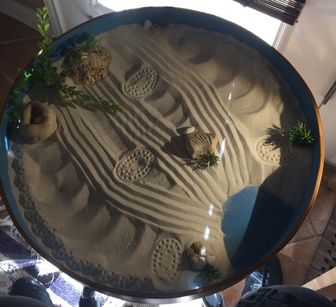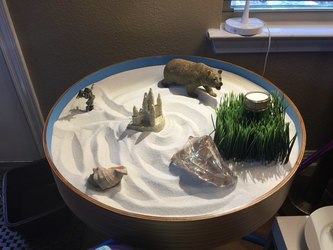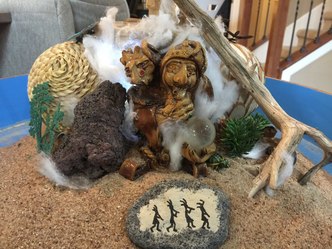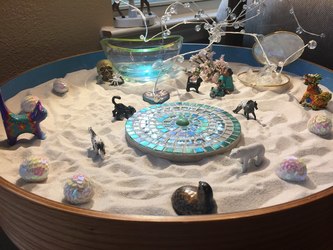SandTray Training
Basic Certification Courses,
Levels One through Four
Required for certification as a Clinical SandTray Therapist (CCST)

Level One:
Basic Tools and Methods: Experiencing the Tray
(12 Contact Hours/2 days)
This workshop introduces the basic tools and methods of SandTray Therapy for both children and adults. Participants explore the various elements of the SandTray Process through hands-on exercises with miniature figurines and SandTrays. In the workshop, therapists use individual SandTrays to practice and refine basic skills.
Prerequisite: Prior knowledge of the SandTray Process is helpful but not necessary.
Workshop Goals:
1. Learn the history of SandTray Therapy
2. Explore the multi-cultural aspects of
SandTray Therapy
3. Create a free and protected space for clients
4. Understand the therapeutic process for
building and witnessing SandTrays
5. Consider neurobiology of the SandTray Process
Basic Tools and Methods: Experiencing the Tray
(12 Contact Hours/2 days)
This workshop introduces the basic tools and methods of SandTray Therapy for both children and adults. Participants explore the various elements of the SandTray Process through hands-on exercises with miniature figurines and SandTrays. In the workshop, therapists use individual SandTrays to practice and refine basic skills.
Prerequisite: Prior knowledge of the SandTray Process is helpful but not necessary.
Workshop Goals:
1. Learn the history of SandTray Therapy
2. Explore the multi-cultural aspects of
SandTray Therapy
3. Create a free and protected space for clients
4. Understand the therapeutic process for
building and witnessing SandTrays
5. Consider neurobiology of the SandTray Process

Level Two:
Basic Clinical Skills and Theory: Using the Symbolic Language of Play
(12 Contact hours/2 days)
In this workshop, participants discuss and work with symbolic meaning and basic theoretical ideas. There are opportunities to create SandTrays in the presence of an observer (workshop partner) and to practice skills using the symbolic language of Play Therapy. Participants also explore the core issues of Play Therapy in the SandTray Process.
Prerequisite: Completion of Level One
Workshop Goals for participants:
1. Develop skills in facilitating SandTray Therapy
2. Identify the importance of attunement in the
therapeutic process
3. Identify therapeutic skills needed as witness in the therapeutic process
4. Learn Association of Play Therapy (APT) “Best Practices” of documentation
in Play Therapy and how it applies to the SandTray Process
5. Understand the influence of the therapist on inter-personal neurobiology
in the therapeutic process
Basic Clinical Skills and Theory: Using the Symbolic Language of Play
(12 Contact hours/2 days)
In this workshop, participants discuss and work with symbolic meaning and basic theoretical ideas. There are opportunities to create SandTrays in the presence of an observer (workshop partner) and to practice skills using the symbolic language of Play Therapy. Participants also explore the core issues of Play Therapy in the SandTray Process.
Prerequisite: Completion of Level One
Workshop Goals for participants:
1. Develop skills in facilitating SandTray Therapy
2. Identify the importance of attunement in the
therapeutic process
3. Identify therapeutic skills needed as witness in the therapeutic process
4. Learn Association of Play Therapy (APT) “Best Practices” of documentation
in Play Therapy and how it applies to the SandTray Process
5. Understand the influence of the therapist on inter-personal neurobiology
in the therapeutic process

Level Three:
Symbolic Integration and Theory: Translating Symbolic language into Verbal Language Using Various Theoretical Orientations
(12 Contact hours/2 days)
In this workshop, participants have numerous opportunities to develop specific skills in working with the language of SandTray Therapy. Therapists use exercises to learn when and how to translate play language into verbal language. Each participant has access to an individual SandTray for practice exercises and for creating individual SandTray worlds.
Prerequisite: Completion of Levels One & Two
Workshop Goals:
1. Develop skills in facilitating SandTray Therapy
2. Consider multi-theoretical perspectives in SandTray
3. Learn about and explore archetypes
4. Understand adult Play Therapy processes in SandTray
5. Identify and practice advanced process and reflecting skills
Symbolic Integration and Theory: Translating Symbolic language into Verbal Language Using Various Theoretical Orientations
(12 Contact hours/2 days)
In this workshop, participants have numerous opportunities to develop specific skills in working with the language of SandTray Therapy. Therapists use exercises to learn when and how to translate play language into verbal language. Each participant has access to an individual SandTray for practice exercises and for creating individual SandTray worlds.
Prerequisite: Completion of Levels One & Two
Workshop Goals:
1. Develop skills in facilitating SandTray Therapy
2. Consider multi-theoretical perspectives in SandTray
3. Learn about and explore archetypes
4. Understand adult Play Therapy processes in SandTray
5. Identify and practice advanced process and reflecting skills

Level Four:
Advanced Clinical Skills: Diagnosis, Treatment planning, Transference, and Ethical Issues
(12 contact hours/2 days)
This workshop includes discussion of professional issues related to diagnosis, treatment planning, transference, and ethical issues of SandTray Therapy. Participants refine and integrate therapeutic skills through hands-on practice with workshop partners. Each participant has an individual SandTray for practice exercises and for creating individual SandTray worlds.
Prerequisite: Completion of Levels One, Two, and Three
Workshop Goals:
The workshops will help participants:
1. Develop skills in facilitating SandTray Therapy
2. Learn how to organize a SandTray Therapy center
3. Explore ethical considerations of SandTray Therapy
4. Develop skills in recording methods for SandTray Therapy
5. Identify theoretical issues and standards of training
Advanced Clinical Skills: Diagnosis, Treatment planning, Transference, and Ethical Issues
(12 contact hours/2 days)
This workshop includes discussion of professional issues related to diagnosis, treatment planning, transference, and ethical issues of SandTray Therapy. Participants refine and integrate therapeutic skills through hands-on practice with workshop partners. Each participant has an individual SandTray for practice exercises and for creating individual SandTray worlds.
Prerequisite: Completion of Levels One, Two, and Three
Workshop Goals:
The workshops will help participants:
1. Develop skills in facilitating SandTray Therapy
2. Learn how to organize a SandTray Therapy center
3. Explore ethical considerations of SandTray Therapy
4. Develop skills in recording methods for SandTray Therapy
5. Identify theoretical issues and standards of training
